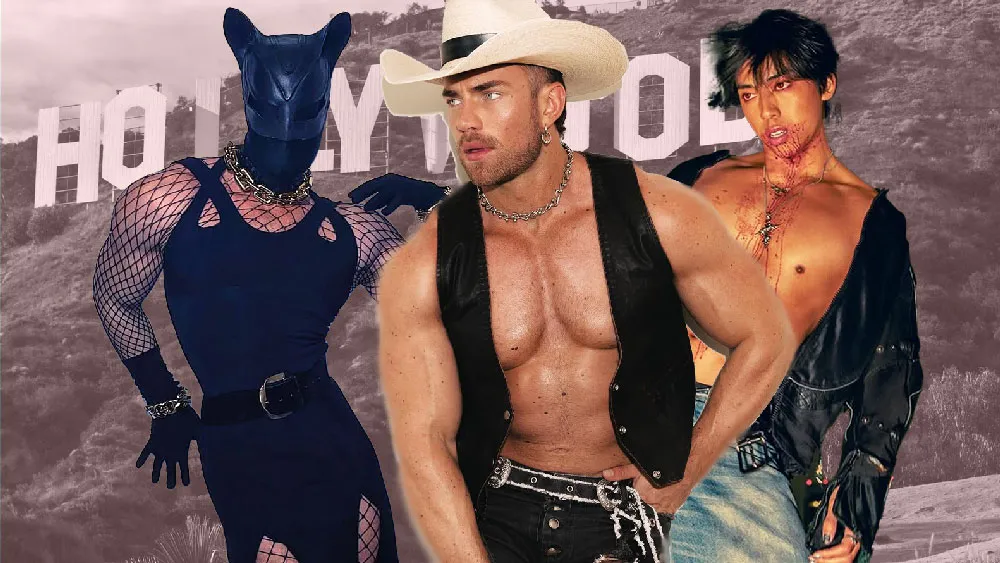May 24, 2021
Review: Jeff Mann's 'Redneck Bouquet' a Garden of Intimate Delights
Kilian Melloy READ TIME: 4 MIN.
Openly gay Appalachian poet, essayist, and novelist Jeff Mann explores appetite, memory, rage, sorrow, loss, and lust in his deeply-felt and forthright poetry collection "Redneck Bouquet," which was a nominee for the latest Weatherford Awards.
Readers of Mann's work will recognize his signature themes - Southern cooking, family, amorous fantasies about tying up country music stars, meditations on beautiful men who are out of reach because they are straight, or age-inappropriate, or both - and his touchstones remain nature, BDSM, politics, and mythology. This unlikely mix of subjects receives some artful rendering, much of it with a cheeky wink: "Here's to Fucking the Famous" isn't just a panting paean to the likes of Tim McGraw, Chris Cagle, Keith Urban, and Gerard Butler; it's also a post-modern sonnet, the classic form of the love poem recast with an edgily contemporary sensibility.
Mann's biographical tendencies give his work a feeling of intimacy, and that in turn brings moments of elegiac tenderness, particularly when he's writing about (or to) his husband, John, or about men he loved in his youth. By the same token, his work swings just as readily toward the ruthlessly martial, as when he ponders "Men I'd like to rape, men / I'd like to kill." This bouquet is colorful, yes, but beware the thorns: They are plentiful, and sharp.
But Mann can be funny, too. Often, his most angry verse is charged with humor, as in the poem "A Brief Christian Visit," in which Mann shoos a coupe of missionaries away fro his door, flexing his brawny, tattooed arms as he does so. Among other sigils nested in his sleeve tattoo are these choice designs, all sure to cause alarm to those who proselytize: "A Mars symbol, a pentagram, / the face of the horned God, a bear paw, thorns / and thistles, a flaming sword."
But what's most keenly felt throughout the collection is a sense of time passing, a sense that's amplified by the collection having been drawn from across a couple of decades. In some poems, Mann reflects on being in his forties; in others, he looks into the mirror to see a man in his fifties staring back. Youth (its regrets and glories alike) are receding, mortality looms, and sexual vigor fades. In "Hemlock" (which is suitably Socratic; the poet's broad education is as prevalent in his verse as his furies and his erotic fervor), Mann contemplates "the abacus of age / tallying the black/ numerals, tallying."
The poems that are centered on nature tend toward twilight themes, as well, with summer gardens feeling the twinge of impending frost. Mann finds comfort in the cycles of nature - "again and again, / the earth regains its youth," he writes in "Gold" - but rejuvenation is a privilege belonging to gods, the sea and soil, and the sky. The rest of us get along as best we can, and a poignant sense of evanescence - and of gratitude - is a refrain this collection's music circles back to. The title poem, which is a lovely meditation about his long marriage, blends all of these emotional tenors most successfully, as Mann weighs his own successes and failures as a mate. "When did we lose the gift of praise?" he wonders, and anyone who's been paired up for a few decades will know just what he's saying.
None of that means Mann's passions are less ferocious, however. Like Dante with an endless assortment of hot male Beatrices in which to exult, Mann waxes libidinous over repairmen, short-order cooks, and hardware store clerks. The feisty flipside lies in how he puts his formidable imagination to use in prescribing punishments for his foes: Anti-LGBTQ preachers, ecologically destructive CEOs, and homophobes of every stripe are in for a lyrical comeuppance. But all is not infernal in Mann's oeuvre; he offers glimpses of Heaven, as well: "beef stew simmering in an eternal autumn while cats nap in a warm house." Mann has described himself elsewhere as a "surly bear," but this bear has an appreciation for the atmospheric, the tranquil, and the domestic. There's more than roughness to his cave.
Mann's poetry has a feel of direct autobiography, and in himself he discovers a myriad of recurring characters that populate these pages - "The Old Lecher" sorrows for goateed youths, the "Gay Redneck" is a reliable commentator on the ironies of being proudly Southern and just as proudly out, and "The Misanthrope" mulls revenge on his enemies with crackling impatience. It's with these personae that Mann illustrates the multifold nature of human life and identity. Mann's not just queer, not just a mountain man, not just a bondage fetishist or a gourmand; he's all of those things, plus a fan of modern epic fantasy, a heartfelt romantic, a tough guy, and a devotee of ancient gods (Celtic and Norse deities among them). His selves runneth over. Poetry is only one of his literary outlets, but it is perhaps his starkest and most intimate, the writerly endeavor most akin to the sexual adventures he pines for. It's in such poetry as this that the word can be made flesh - or, perhaps, vice-versa.
"Redneck Bouquet," by Jeff Mann. 118 pages / $10. Available now from Lethe Press.
Kilian Melloy serves as EDGE Media Network's Associate Arts Editor and Staff Contributor. His professional memberships include the National Lesbian & Gay Journalists Association, the Boston Online Film Critics Association, The Gay and Lesbian Entertainment Critics Association, and the Boston Theater Critics Association's Elliot Norton Awards Committee.





